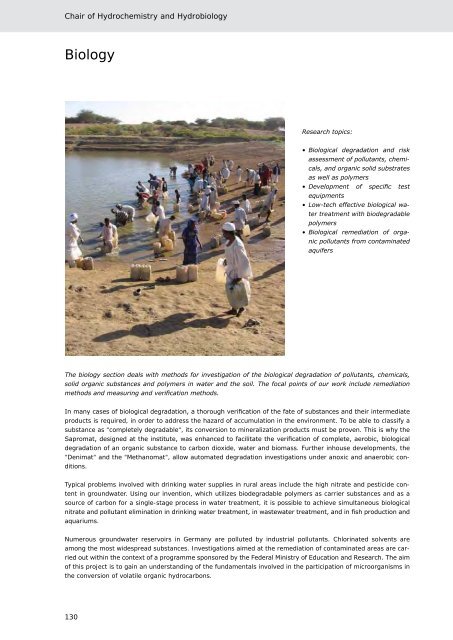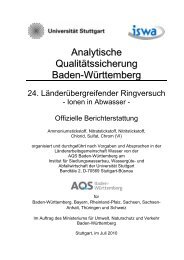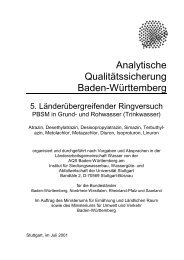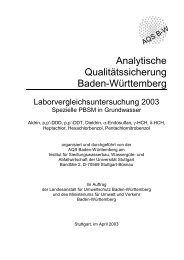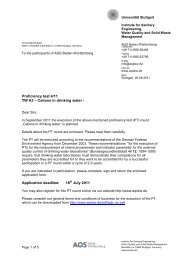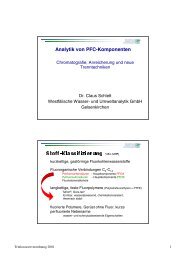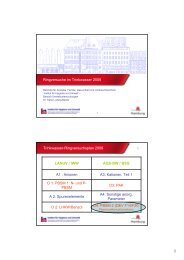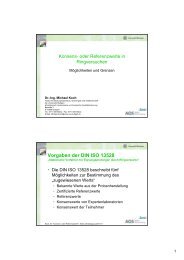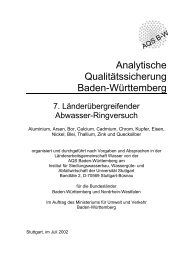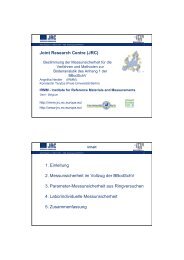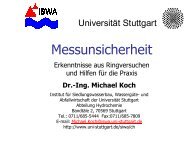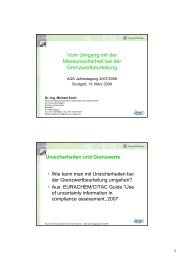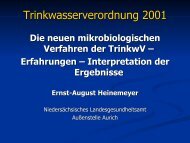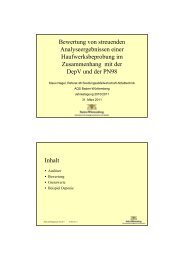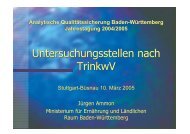Institute for Sanitary Engineering, Water Quality and Solid Waste ...
Institute for Sanitary Engineering, Water Quality and Solid Waste ...
Institute for Sanitary Engineering, Water Quality and Solid Waste ...
Create successful ePaper yourself
Turn your PDF publications into a flip-book with our unique Google optimized e-Paper software.
Chair of Hydrochemistry <strong>and</strong> Hydrobiology<br />
Biology<br />
Research topics:<br />
• Biological degradation <strong>and</strong> risk<br />
assessment of pollutants, chemicals,<br />
<strong>and</strong> organic solid substrates<br />
as well as polymers<br />
• Development of specific test<br />
equipments<br />
• Low-tech effective biological water<br />
treatment with biodegradable<br />
polymers<br />
• Biological remediation of organic<br />
pollutants from contaminated<br />
aquifers<br />
The biology section deals with methods <strong>for</strong> investigation of the biological degradation of pollutants, chemicals,<br />
solid organic substances <strong>and</strong> polymers in water <strong>and</strong> the soil. The focal points of our work include remediation<br />
methods <strong>and</strong> measuring <strong>and</strong> verification methods.<br />
In many cases of biological degradation, a thorough verification of the fate of substances <strong>and</strong> their intermediate<br />
products is required, in order to address the hazard of accumulation in the environment. To be able to classify a<br />
substance as “completely degradable“, its conversion to mineralization products must be proven. This is why the<br />
Sapromat, designed at the institute, was enhanced to facilitate the verification of complete, aerobic, biological<br />
degradation of an organic substance to carbon dioxide, water <strong>and</strong> biomass. Further inhouse developments, the<br />
“Denimat“ <strong>and</strong> the “Methanomat“, allow automated degradation investigations under anoxic <strong>and</strong> anaerobic conditions.<br />
Typical problems involved with drinking water supplies in rural areas include the high nitrate <strong>and</strong> pesticide content<br />
in groundwater. Using our invention, which utilizes biodegradable polymers as carrier substances <strong>and</strong> as a<br />
source of carbon <strong>for</strong> a single-stage process in water treatment, it is possible to achieve simultaneous biological<br />
nitrate <strong>and</strong> pollutant elimination in drinking water treatment, in wastewater treatment, <strong>and</strong> in fish production <strong>and</strong><br />
aquariums.<br />
Numerous groundwater reservoirs in Germany are polluted by industrial pollutants. Chlorinated solvents are<br />
among the most widespread substances. Investigations aimed at the remediation of contaminated areas are carried<br />
out within the context of a programme sponsored by the Federal Ministry of Education <strong>and</strong> Research. The aim<br />
of this project is to gain an underst<strong>and</strong>ing of the fundamentals involved in the participation of microorganisms in<br />
the conversion of volatile organic hydrocarbons.<br />
130


